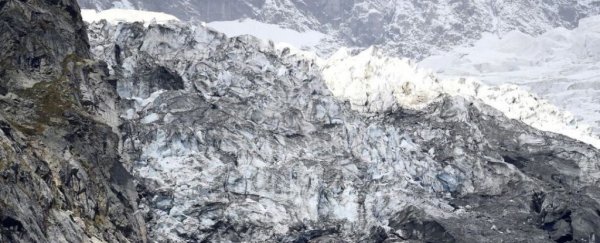Global warming has put a glacier in the Italian Alps at risk of collapse, officials warned, leading to road closures, travel restrictions, and evacuations in the immediate vicinity.
Municipal officials issued the order after surveyors observed a significant increase in the sliding speed of the Planpincieux glacier, which rests on the Italian side of the Grand Jorasses peak. The mountain is one of several in the Mont Blanc massif, which runs through Italy, France and part of Switzerland.
Surveys had shown that the lower portion of the glacier was moving 19 to 23 inches (48 to 58 cm) per day, prompting the closure of certain roads and the precautionary evacuation of some residences in zones closest to the glacier.
In safer areas, residents, workers and public officials and employees would be allowed to access the roads, but only emergency vehicles would be permitted to travel after dark.
It was not clear that the Planpincieux glacier's collapse was imminent, and officials conceded that they had no warning system for such an event. But officials say the glacier's precarious status was the result of a climate emergency that had already begun, and over which an international group of scientists sounded yet another alarm this week.
"These phenomena testify once again how the mountain is in a phase of strong change due to climatic factors, therefore it is particularly vulnerable," the mayor of Courmayeur, Stefano Miserocchi, said in a statement.
"In this case it is a temperate glacier particularly sensitive to high temperatures."
Speaking at the UN General Assembly on Tuesday, Italian Prime Minister Giuseppe Conte echoed the mayor's comments.
"It is now news that a glacier on Mont Blanc risks collapsing," Conte said. "It's an alarm that cannot leave us indifferent. It must shake us all and mobilize us."
Discussion of the impending climate catastrophe dominated the first days of the annual UN meeting in New York. The week kicked off with teen climate activist Greta Thunberg's passionate call for world leaders to take significant action on climate change.
On Wednesday, the organization's Intergovernmental Panel on Climate Change released yet another ominous report about the effects already underway.
"Glaciers, snow, ice and permafrost are declining and will continue to do so," the scientists wrote in a statement accompanying the report. "This is projected to increase hazards for people, for example through landslides, avalanches, rockfalls and floods."
"Smaller glaciers found for example in Europe, eastern Africa, the tropical Andes and Indonesia are projected to lose more than 80 percent of their current ice mass by 2100 under high emission scenarios," the statement continued. That glacial loss would "continue to adversely affect recreational activities, tourism, and cultural assets."
The glaciers in the Alps provide vital water and meet the hydroelectric needs of the region and play a key role in tourism.
But under a limited global warming scenario, these frozen resources could lose two-thirds of their volume by the end of the century, according to a study published in April in the Cryosphere journal.
Under a stronger global warming model, the researchers, based in Switzerland, projected that the Alps's glaciers would disappear almost entirely by 2100.
The melting process is already underway. On Sunday, hundreds of people gathered in Switzerland to mourn the Pitzol glacier. It had lost 80 to 90 percent of its volume since 2006.
2019 © The Washington Post
This article was originally published by The Washington Post.
